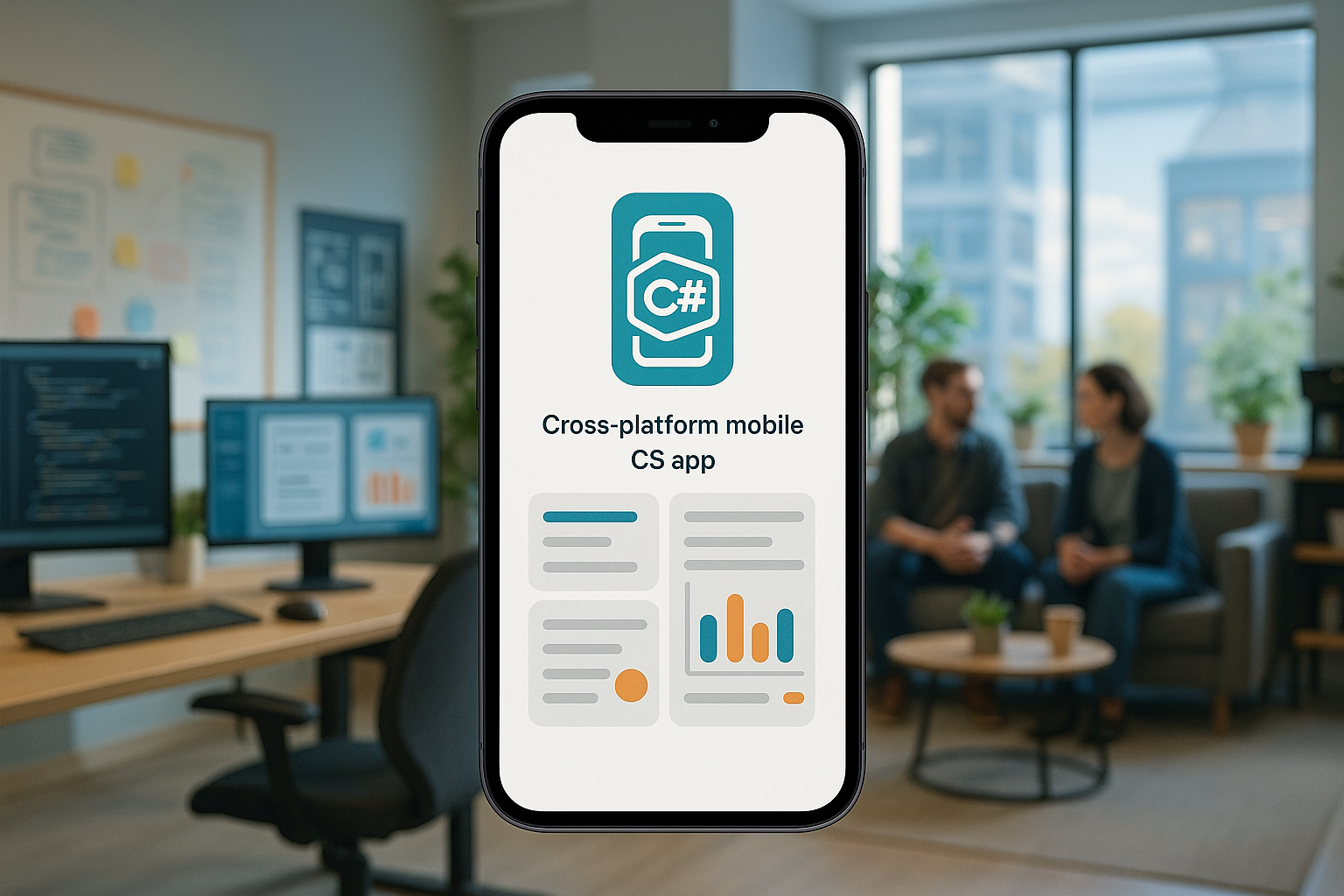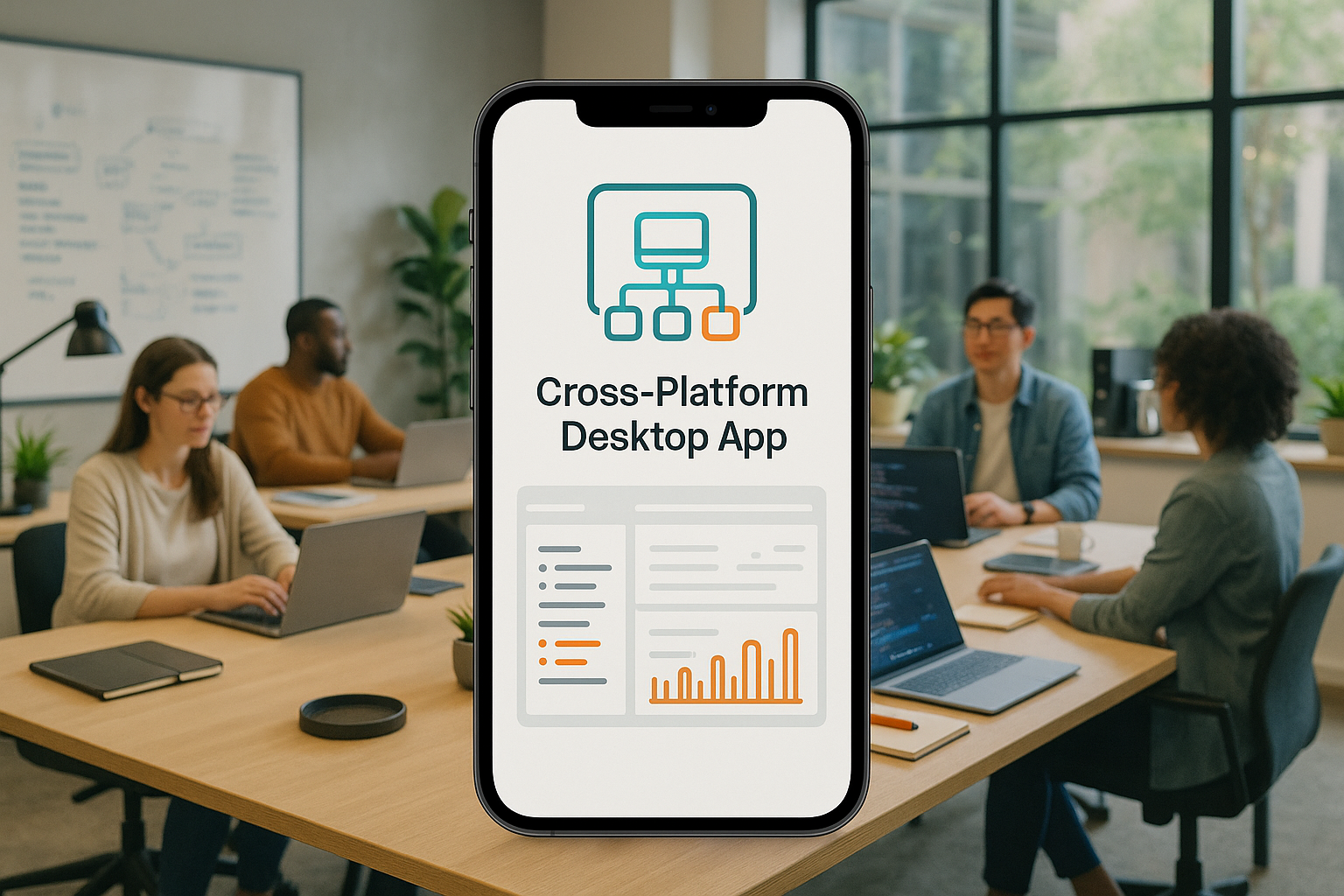Introduction
The promise of cross-platform mobile development is a powerful one for any business: write your application once, and deploy it everywhere. For organizations heavily invested in the Microsoft ecosystem, using C# to build mobile apps for iOS, Android, macOS, and Windows seems like the ultimate efficiency. This unified approach promises to reduce development time, streamline maintenance, and leverage existing C# talent. However, the path from a great idea to a successful, multi-platform C# application is fraught with technical complexities and potential pitfalls. Many in-house teams, while proficient in C#, find themselves unprepared for the unique challenges posed by modern cross-platform frameworks.
Issues with UI customization, library incompatibilities, performance tuning, and questions about production readiness can quickly turn a promising project into a frustrating and costly endeavor. These hurdles often require a level of specialized expertise and experience that goes beyond standard application development. Without a seasoned partner, businesses risk launching an app that feels clunky, performs poorly, or fails to meet user expectations on different devices.
This article serves as a comprehensive guide to the world of cross-platform mobile C# app development. We will explore what these applications are, delve into the specific reasons why they can be so difficult to build in-house, and discuss the real costs involved beyond the “free” price tag of the framework itself. We will also highlight top development companies that specialize in this domain.
As a leading US AI-powered app development firm with over two decades of experience and more than 120 successful projects, we at MetaCTO have navigated these challenges countless times. We partner with businesses to transform their vision into a high-performing, scalable mobile application. We handle every step of the process, from initial validation and strategy to building, growing, and monetizing your app, ensuring you avoid the common traps and go to market with a product that is better than you could have imagined.
What is a Cross-Platform Mobile C# App?
At its core, a cross-platform mobile C# app is an application built using a single C# codebase that can run natively on multiple operating systems, such as iOS, Android, macOS, and Windows. The primary technology enabling this today is .NET Multi-platform App UI, or .NET MAUI.
.NET MAUI is a modern, open-source framework from Microsoft designed to be the evolution of its predecessor, Xamarin.Forms. It represents a significant step forward in simplifying the development process for multi-platform applications. The fundamental principle of .NET MAUI is to allow developers to build one project that targets all supported devices. It accomplishes this by abstracting the platform-specific, native UI toolkits of each operating system into a single, common framework built on .NET.
A Single Codebase for a Native Feel
The key advantage of .NET MAUI is its ability to create apps that look and feel native to each platform. When you build a .NET MAUI app, you are not creating a web view packaged in a native shell. Instead, the framework uses the latest technologies to render native UI controls on each platform. A button in your C# code becomes a UIButton on iOS, an AppCompatButton on Android, and a Button on Windows. This means your app automatically adopts the design language, user experience conventions, and performance characteristics of the device it is running on.
Developers work within a single C# codebase and project system, which drastically reduces the complexity of managing different codebases for each target platform. This shared logic covers not just the business rules and data access layers but also the user interface itself. .NET MAUI provides a comprehensive set of controls that map to native elements, allowing for the construction of rich user interfaces from a single, shared UI layer.
The Power of the .NET Ecosystem
Developing with .NET MAUI is further enhanced by its deep integration with the broader .NET ecosystem. Key benefits include:
- Visual Studio Integration: The development experience is tightly integrated with Visual Studio, helping developers build, debug, and deploy beautiful apps faster and easier across all target platforms.
- Reusable UI Components: To accelerate development, .NET MAUI supports a rich market of reusable UI components from top-tier vendors. Companies like Syncfusion, DevExpress, UX Divers, and Telerik offer sophisticated, pre-built controls like charts, data grids, and schedulers that can be seamlessly integrated into a MAUI application.
- Real-World Application: The framework is proven in real-world scenarios. Microsoft showcases its capabilities with the .NET eShop app, a sample application demonstrating how to build a complete, enterprise-grade mobile app. For those looking to build complex systems, the “Enterprise Application Patterns Using .NET MAUI” e-book provides architectural guidance on best practices.
In essence, a cross-platform C# mobile app built with .NET MAUI offers the best of both worlds: the development efficiency and code reuse of a cross-platform framework, combined with the performance and user experience of a truly native application.
Reasons That It Is Difficult to Develop a Cross-Platform Mobile C# App In-House
While .NET MAUI provides a powerful foundation, the reality of building a polished, large-scale, and feature-rich application in-house presents significant challenges. Many of these difficulties stem from the inherent complexities of abstracting multiple native platforms and the relative newness of the MAUI framework itself. An in-house team may find themselves spending more time fighting the framework than building features, leading to project delays and budget overruns.
The UI Customization Conundrum
One of the most common and frustrating hurdles is UI customization. While .NET MAUI does an excellent job of providing default native controls, stepping outside these defaults can be unexpectedly difficult.
- Inherent Cross-Platform Limitations: Any cross-platform technology will have limitations in UI flexibility compared to writing code directly for the native platform. The abstraction layer that provides convenience can also become a barrier to granular control.
- Incomplete Design Language Support: Although the principles of Google’s Material Design are implemented in MAUI, they are not fully supported. This can lead to inconsistencies or require significant workarounds to achieve a specific visual style on Android.
- The High Cost of Custom Components: If the extensive libraries of built-in or third-party components are not sufficient for your project’s unique needs, creating custom components from scratch requires a steep increase in labor costs and a substantial effort from developers who must understand the native rendering pipeline. For example, heavily customizing a simple search box might require platform-level work on iOS and Android separately, defeating some of the purpose of a shared codebase and demanding significant effort.
- Effort Beyond the Defaults: If your designers and product owners require a UI that goes beyond MAUI’s default tools and templates, the customization effort can quickly exceed what would be required using other frameworks. The framework has features that, while powerful, can slightly limit the possibilities of deep UI customization.
- Difficulty with Complex Elements: Certain design solutions, particularly those involving complex lists with varied item templates or sophisticated animations, can be notoriously difficult to implement smoothly and performantly with MAUI.
These UI challenges mean that a team without deep expertise in both .NET MAUI and the underlying native platforms can struggle to deliver the pixel-perfect experience your brand demands. This is an area where our team at MetaCTO excels, leveraging our deep experience to build beautiful, custom UIs that perform flawlessly. For projects that have hit a wall due to these issues, our Project Rescue services can provide a clear path forward.
Technical and Compatibility Hurdles
Beyond the UI, developers often face a landscape of technical and compatibility issues, largely because .NET MAUI is still a relatively new technology.
- Third-Party Library Support: Not all third-party .NET libraries, especially older ones, may be compatible with .NET MAUI. This can be a major roadblock if your application relies on a specific library for a critical function. In these cases, ensuring compatibility across all target platforms may require seasoned .NET engineers to find suitable alternative libraries or, in a worst-case scenario, build custom solutions from the ground up.
- Platform Support Gaps: .NET MAUI has made clear choices about what it supports. It does not support Android versions below 5.0 (API 21), nor does it support older Windows technologies like Windows Presentation Foundation (WPF) or Universal Windows Platform (UWP). If your user base includes these older platforms, MAUI is not a viable option.
- Experimental Features: Some integrations are still maturing. For instance, MAUI’s integration with Blazor for building web-based UI is still in its early stages. Relying on it for a core part of your application is considered experimental for now and may lack the stability required for a production environment.
Developer Experience and Production Readiness
The .NET MAUI framework is still a subject of debate within the development community due to several well-known issues that can impact productivity and final product quality.
- Known Issues: Developers frequently report facing challenges with tooling, inconsistent performance across platforms, and the previously mentioned limited library support. These are not insurmountable problems, but they require an experienced hand to navigate.
- Production-Readiness Concerns: Due to these factors, there are lingering concerns in the developer community about whether .NET MAUI is fully production-ready for very large-scale, complex enterprise projects. Many developers are still reporting that they have trouble working with the framework effectively.
Ultimately, these challenges point to a critical conclusion: successfully building a cross-platform C# app with .NET MAUI requires more than just C# knowledge. It requires a team of expert engineers who understand the framework’s nuances, can dive into native code when necessary, and know how to work around the current limitations. As the facts suggest, if in-house skills are insufficient to work with MAUI, it is worth involving external developers. Partnering with a specialized agency like MetaCTO de-risks your project and ensures you are building on a solid foundation from day one.
Cost Estimate for Developing a Cross-Platform Mobile C# App
When considering the cost of development, it is easy to be misled by the fact that the core technology is free. The provided research states that the Xamarin framework—the predecessor to .NET MAUI—is free. By extension, .NET MAUI itself is also a free, open-source framework provided by Microsoft. However, this only means you do not pay a licensing fee for the software development kit (SDK).
The true cost of developing a cross-platform C# mobile app lies not in the tools but in the time and expertise required to use them effectively. The “free” framework is just the starting point; the significant investments are in development, design, testing, and maintenance.
The challenges detailed in the previous section directly translate into costs:
- Increased Labor for Customization: Every time your team needs to create a custom component or wrestle with the UI to match a specific design, the development hours—and therefore costs—climb. The need for “increased labor costs and some additional effort from developers” is a very real budget item.
- Cost of Senior-Level Talent: Navigating library incompatibilities, performance tuning, and tooling issues is not a task for junior developers. It requires “seasoned .NET engineers” who command higher salaries and are harder to find. If your in-house team lacks this specific MAUI expertise, you face the cost of hiring, or the opportunity cost of a delayed or flawed product.
- The Price of Delays: Every week your team spends debugging a framework issue is a week you are not in the market. The cost of a delayed launch can be measured in lost revenue, missed market opportunities, and giving competitors a head start.
This is why engaging a specialized development agency can be a more cost-effective solution in the long run. At MetaCTO, we provide a clear and predictable path to launch. Our Rapid MVP Development service, for instance, is designed to take you from idea to a market-ready app in just 90 days. This approach allows you to validate your concept, gather user feedback, and begin generating revenue on a controlled budget and timeline, transforming unpredictable development costs into a strategic investment.
Top Cross-Platform Mobile C# App Development Companies
Choosing the right development partner is the single most important decision you can make when building a cross-platform C# mobile app. You need a team with proven experience, deep technical knowledge of the .NET MAUI framework, and a track record of delivering successful mobile applications. Here are some of the top companies and experts in the field.
1. MetaCTO
As a premier, US-based AI-powered mobile app development firm, we at MetaCTO are uniquely positioned to lead your cross-platform C# app development project. With over 20 years of experience, a portfolio of over 120 successful projects, and a 5-star rating on Clutch, we have a proven process for turning complex challenges into market-leading applications.
We understand that building an app is more than just writing code. Our holistic approach covers the entire product lifecycle to ensure your success:
- Validate: We help you turn your idea into a Minimum Viable Product (MVP) quickly, often in as little as 90 days, allowing you to test the market, secure feedback, and attract investors on a lean budget.
- Build: We handle the entire development process—from strategy and design to building and launching. Our team of seasoned engineers are experts at navigating the complexities of .NET MAUI, ensuring your app has a beautiful, custom UI, robust backend, and a smooth user experience from day one.
- Grow & Monetize: Launching is just the beginning. We use analytics and A/B testing to optimize user acquisition and retention, and we help you implement the right monetization strategies, whether through subscriptions, ads, or in-app purchases.
- Evolve: As your business scales, we ensure your app evolves with it, leveraging the latest technology to keep you competitive.
We are not just a development shop; we are your strategic technical partner. If you are looking to build a successful, scalable, and high-performing cross-platform C# mobile app, we are the team to make it happen. You can learn more about our Custom Mobile App Development services on our website.
2. AvantiPoint
Led by prominent .NET MAUI community figure Dan Siegel, AvantiPoint is a key player in the MAUI ecosystem. The company not only offers development services around .NET MAUI but also contributes significantly to the community by producing open-source libraries that help other developers. Their deep involvement with the framework makes them a knowledgeable choice for MAUI-centric projects.
3. CrossGeeks
CrossGeeks is a consulting firm that built its reputation with a strong focus on Xamarin, the direct predecessor to .NET MAUI. This deep history with Microsoft’s cross-platform technology gives them a wealth of experience that is directly applicable to building .NET MAUI applications. Their long-standing expertise in the C# mobile ecosystem makes them a reliable and experienced partner.
4. Ontop
While Ontop is a fintech company and not a development agency, it is notable for applying .NET MAUI in its production applications. Leomaris Reyes, a well-known .NET developer and speaker, uses her MAUI skills to build and maintain their apps. A company successfully using a technology in a live, demanding production environment is a strong testament to the real-world expertise of its engineering team.
5. Trailhead Technology
Trailhead Technology is a custom software development company that is home to Matt Soucoup, another leading expert and voice in the .NET MAUI community. Having top-tier talent like Matt on the team indicates a high level of capability and commitment to Microsoft’s cross-platform framework, making them a strong contender for a variety of development projects.
Conclusion
Developing a cross-platform mobile app with C# and .NET MAUI offers the compelling advantage of a single codebase for multiple native platforms. It promises efficiency, a native look and feel, and access to the powerful .NET ecosystem. However, as we have explored, the path to realizing this promise is filled with significant challenges. The complexities of UI customization, the risks of library and platform incompatibilities, and concerns around performance and tooling require a level of expertise that many in-house teams do not possess.
The framework’s “free” cost is deceptive; the real investment lies in the highly skilled engineering talent needed to navigate these issues effectively and avoid costly delays. Attempting to build a large-scale, polished MAUI application without this specialized experience can put a project at risk of failure.
This is why partnering with a dedicated mobile app development agency is often the most strategic and cost-effective path forward. At MetaCTO, we bring two decades of experience and a team of seasoned experts to your project. We have mastered the intricacies of cross-platform development and have a proven process for building, launching, and scaling successful mobile applications. We mitigate the risks so you can focus on your business, confident that your technology is built for success from day one.
If you are ready to turn your vision for a cross-platform C# mobile app into a reality, let’s build it the right way, together.
Talk with a Cross-Platform Mobile C# app development expert at MetaCTO.






